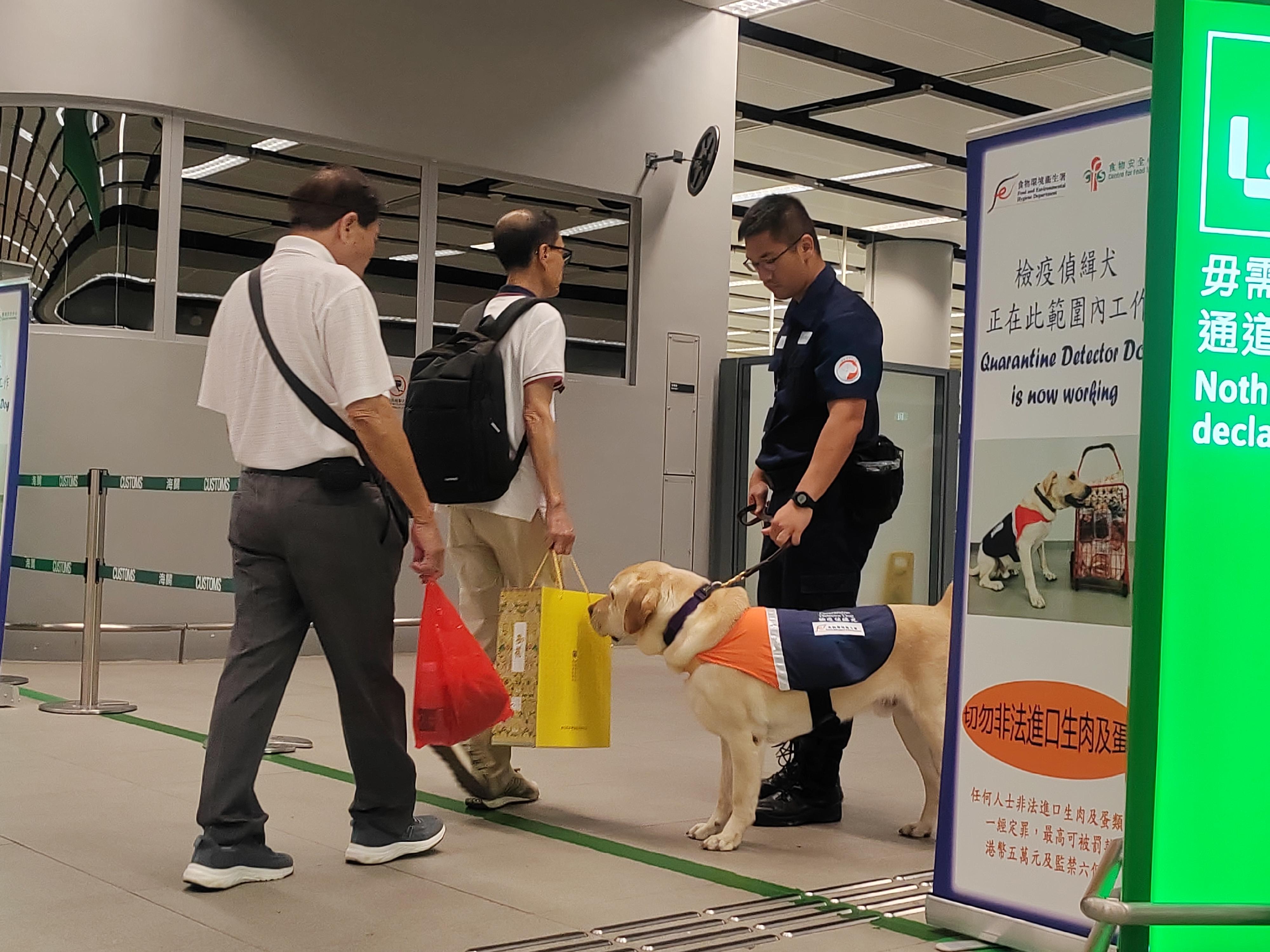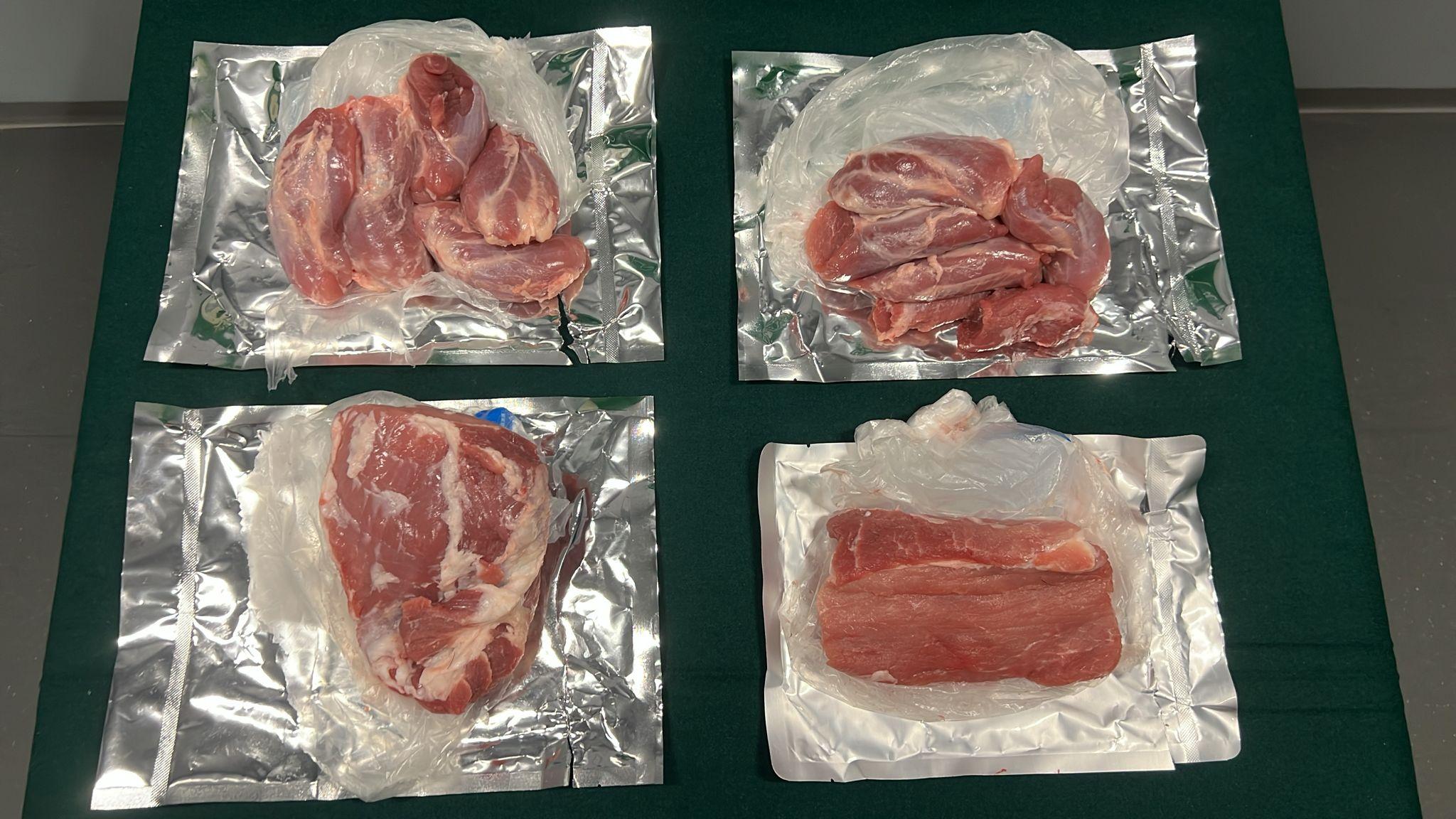CFS strengthens crackdown on inbound persons illegally bringing regulated food into Hong Kong (with photos)
A spokesman for the Centre for Food Safety (CFS) of the Food and Environmental Hygiene Department (FEHD) announced today (June 13) that in order to combat inbound persons illegally bringing regulated food into Hong Kong, the CFS has stepped up interception and mounted enforcement actions, and deployed quarantine detector dogs to assist law enforcement officers in carrying out their duties at various land boundary control points, all in an effort to safeguard public health.
During the CFS's operation yesterday (June 12), an inbound person was detected by a quarantine detector dog, suspected of bringing regulated food into Hong Kong. Upon investigation by law enforcement officers, raw meat packaged in foil was found in the personal baggage of the inbound person, without being accompanied by an import licence and an official health certificate issued by the issuing entity of the place of origin. Should there be sufficient evidence, prosecution will be instituted against the person involved. The investigation is ongoing.
The CFS will continue to maintain close liaison and exchange of intelligence with other enforcement departments, including Hong Kong Customs, and step up enforcement operations at various boundary control points. As of yesterday, the CFS has instituted 715 prosecutions against inbound persons for illegally bringing regulated food into Hong Kong this year.
Under the Import and Export Ordinance (Cap. 60), each consignment of imported meat and poultry is required to apply for an import licence from the FEHD. In addition, pursuant to the Imported Game, Meat, Poultry and Eggs Regulations (Cap. 132AK), each consignment of imported game, meat, poultry and eggs (regulated food), whether for personal use or not, must be accompanied by a health certificate issued by the issuing entity of the place of origin or written permission from the FEHD. Offenders are liable on conviction to a maximum fine of $50,000 and six months' imprisonment under Cap. 132AK. Regulated food entering Hong Kong from the Mainland must be accompanied by a health certificate issued by Mainland Customs to prove that the food is from registered processing plants for supplying to Hong Kong recognised by the Mainland regulatory authority.
The CFS reminds members of the public not to defy the law and import regulated food without a recognised health certificate, written permission from the FEHD or import licence. In addition, the CFS will continue strengthening publicity and education at various control points and reminding the public through various channels (e.g. websites, posters, leaflets and social media) that they must abide by the relevant Hong Kong laws when purchasing food across the boundary.
Ends/Thursday, June 13, 2024
A spokesman for the Centre for Food Safety (CFS) of the Food and Environmental Hygiene Department announced today (June 13) that in order to combat inbound persons illegally bringing regulated food into Hong Kong, the CFS has stepped up interception and mounted enforcement actions, and deployed quarantine detector dogs to assist law enforcement officers in carrying out their duties at various land boundary control points, all in an effort to safeguard public health. Photo shows a quarantine detector dog assisting a law enforcement officer carrying out his duties at a boundary control point.

A spokesman for the Centre for Food Safety (CFS) of the Food and Environmental Hygiene Department announced today (June 13) that in order to combat inbound persons illegally bringing regulated food into Hong Kong, the CFS has stepped up interception and mounted enforcement actions, and deployed quarantine detector dogs to assist law enforcement officers in carrying out their duties at various land boundary control points, all in an effort to safeguard public health. During the CFS's operation yesterday (June 12), an inbound person was detected by a quarantine detector dog, suspected of bringing regulated food into Hong Kong. Photo shows the raw meat found by law enforcement officers in the personal baggage of the inbound person.





